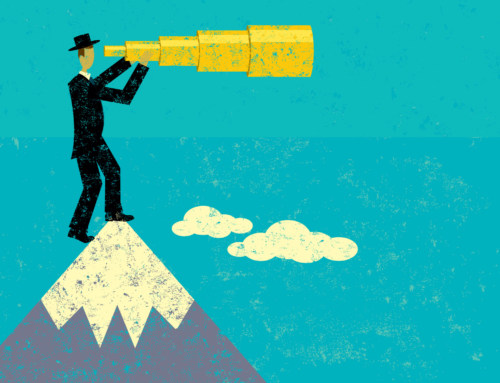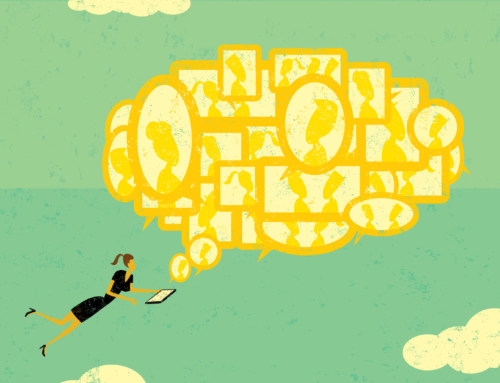Let’s assume you had just three hours to prepare a very important presentation at work. Would you still check your inbox every ten minutes? Would you still work in your cubicle with a dozen of people chitchatting away in the background? Would you still find the time to let your inner critic tell you that you are not qualified enough for the job?
Probably not. It just wouldn’t allow you to fully immerse yourself in the preparation of your talk. It just wouldn’t make you as productive as you could be. It would keep you from getting the task done.
In a nutshell: It would prevent you from achieving flow!
In positive psychology, flow is known as a mental state in which we experience a feeling of energized focus, full involvement and enjoyment in the process of an activity. Action and awareness merge and our subjective experience of time and space is altered. We perform at the top of our game and are highly motivated. According to a study conducted by McKinsey, top executives report being five times more productive in flow. If we could increase the time we spend in flow by 15-20%, our workplace productivity would almost double.
So what can we do to experience more flow at work, respectively in life? The answer has already been given by Plato more than 2300 years ago: Know yourself!
Based on our experience as a life coaches, workshop facilitators and managers in the corporate and education world, we will translate this rather cryptic Ancient Greek aphorism to our modern day world of endless distractions that will let you create your outer and inner context accordingly.
Here are three top tips:
1. KNOW YOUR PERSONAL PREFERENCES
Do you recharge your batteries when you are around people or when you are alone?
In today’s corporate world, many companies emphasize the importance of working in teams and schedule more meetings per day than anyone can handle. Especially for the introverts among us, those who need alone time in order to flourish, this setting is not conducive for creating flow. And even those extroverts out there, those who strive when being around people, need time for themselves to reflect and think deeply about complex issues before sharing their thoughts with others.
Becoming aware of your personal preferences can help you design your work environment.
If you manage a team, provide spaces where your team members can withdraw from the hustle and bustle of an open-plan office and get into their zone in a quiet and more inspiring room. When facilitating meetings, make sure to pre-consider the participants’ needs and use a facilitation style that fosters psychological safety for everyone to fully engage in the conversation or task.
A great starting point to find out what personal preference type you are, is the free online test of 16Personalities (side note: Prevent yourself from clicking this link now. It will stop you from experiencing flow while reading this article).
2. CHOOSE TO MANAGE YOUR ENERGY & ATTENTION (instead of your time)
You could argue that creating flow in today’s work environment is almost impossible, based on increasing technological options to be available 24/7. True, options for availability and information overload are growing. However, it remains an underestimated personal choice how we let our energy and focus be diluted by these options.
Because: The currency of information is attention. In order to process information, you need to (literally) pay attention. And attention is not only finite, it is also something that needs to be directed and trained.
There are various options how to train our mind and behavioural patterns to manage our energy and attention. One very tangible example is the Eisenhower Matrix – it supports you to break down your tasks into important and urgent ones. When you manage your time, you focus solely on the time-pressing, urgent topics. When you manage your energy & attention, you focus on important tasks first (yes, sometimes the important to dos are also urgent!) and steer your attention accordingly.
To give you an example, let’s suppose you realize that your most productive time of the day is in the morning between 9-11 am. It’s when your brain functions best. That’s your chance to use your time in an effective and mindful way: by focusing solely on your priorities. So: Don’t check your inbox. Don’t make that annoying phone call. Rather clear your schedule and give that one important task your full attention for at least one hour. Sounds easier than it is. It all starts with you and your personal choice & commitment.
3. KNOW YOUR VALUES AND SKILLS
If we seek to create more flow, hence engage in an activity with all of our heart, it’s important that what we are doing is in line with what we hold dear to our heart – what we value in life.
Of course you could argue: If you want to be successful in today’s (business) world, you have to sell out on your values or wait until retirement.
Or:
if you really want to live a value-based, purposeful life, you – more or less – have to drop out of the game. Instead of making it an either/or question, here’s a
perspective:
Your values, the attributes that are important to you and that you want to stand for, are even more reflected by how you do something than by what you do.
And with that, again comes personal choice or responsibility since every situation is your ‘ability to respond’. For example, you can be an empathic leader, you can be a passionate team member, you can communicate clearly. Sure, this needs reflection and practice. But it is part of creating that inner & outer context for a focused, complete state of mind that nourishes a flow experience.
At the same time, if your personal values & skill sets are not aligned with a corporate agenda, it cannot go on for too long, as you will feel how you gradually become more reluctant to do the tasks assigned to you. For most of our coaching clients, this is their number one reason why they explore new options.
As a team leader or manager it is vital to develop a genuine interest for your team members, to find out what makes their hearts sing and how their skills match their roles & goals. As an employee, it is your responsibility to communicate your values and skills to your boss and take care of yourself.
THUS, OUR MESSAGE IS THIS:
Start taking responsibility for creating the inner & outer environment you need in order to get into the zone and get things done with more ease! This won’t just make you happier and more motivated. It will also be highly beneficial to your team and your company.
by Elly Oldenbourg (http://www.i-choose.de) and Sven von der Heyde






